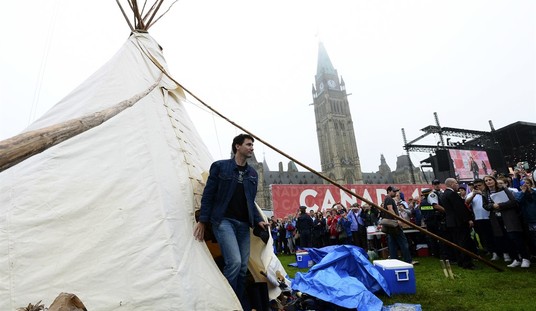Although he didn’t have politics in mind, marketing provocateur Seth Godin wrote on his blog:
How can we get large groups of people to value our craft and buy from us again? … In terms of educating the masses to differentiate yourself, the market is broken. Fixing this is almost always a losing battle. Just because you’re good at something doesn’t mean the market cares any longer. … It’s extremely difficult to repair the market.
Politics get mass-marketed, and niche-marketed, and permission-marketed. But what’s the product? Is it a politician, an ideology, a vision for the future, a body of policy expertise?
As we survey the landscape in January 2010, with Democrat-dominated legislative and executive branches at the federal level and far too many states, perhaps Republicans need to ask:
Where has the market gone? Should we go there? What kinds of change would be required to go there? Would we need to alter our principles, practices, personality, or some combination of the three?
My guess is that if you’re reading this, you think you know the answer. It’s patently obvious. I think I know — but upon what data is my knowing based? Legions of consultants, pundits, and pols think they know, and they make a dandy living boldly proclaiming this knowledge.
However, there’s a tendency in politics to believe that whatever wins an election is what the people want. Whatever strategy or tactics were employed to produce victory the last time are the new formulas for success. Recent Republican victories in Virginia, New Jersey, and a near-miss in New York’s 23rd congressional district bring great encouragement to partisans.
However, if we assume we have found a formula for success, our assumptions are amiss.
We’re always fighting the last war on a broad strategic basis, but it’s in the trenches — where foot soldiers innovate to meet the exigencies of the moment — that victory happens. Until recently, there were few channels for distributing the lessons from my trench in Pennsylvania to yours in Wyoming. The internet has changed all of that — it has given us an opportunity to share lessons learned, but also to realize that there’s no cookie cutter for electoral success.
Former House Majority Leader Thomas “Tip” O’Neill purportedly said: “All politics is local.”
I disagree. That’s not putting a fine enough point on it. Truth is: All politics is personal.
There are no demographics, psychographics, or polls that provide a reliable compass going forward. You can take snapshots of the past, but not of the future. I’m not saying these pursuits are useless, but perhaps the mentality of mass-marketing has distracted us from the fact that there are no voting blocs.
There’s just one voter. In other words, “the market” is a woman, a man … one person.
Of course, since one woman cannot generate a six-figure annual salary for a consultant, they have to lump her together with millions of others and develop clever buzzwords to describe the proclivities of this massified, de-personalized woman. They sell you software and polls aimed at generating generalizations.
But the market is one woman. And she will do as she pleases.
The engineers and designers in the ivory tower may think that their genius makes the product great, but the woman who buys doesn’t even care about the things that make their hearts thump. She buys for her own personal, peculiar reasons, and the ivory tower boys don’t even know it. They’re playing in a kind of fantasy sports league that sounds weird to her. Yet they go on raking in the dough by convincing others that they know.
What if the experts are wrong? What if the past only teaches us the value of self-fulfilling prophecy? What if the plummeting voter turnout numbers in local elections are the most potent political statement the voter makes? What if the basic calculus in the voting booth comes down to “Which candidate seems most like me?” If there isn’t one like me, then I’ll vote against the one who seems least like me. If all are too distant from that gold standard, I’ll bypass the polling station and head straight for real life at home, or at work.
All politics is personal.
At this point, you may think I’ve ridden off into the sunset on a horse named Post Modern, to a place where nothing can be known — or at least nothing of practical value. But far from it. In fact, I think the solution is near at hand. Our forefathers had enough foreknowledge to construct a system built around the truth that all politics is personal.
Where I live in Lehigh County, Pennsylvania, we have 154 voting precincts, each composed of roughly 1,500 registered voters on average. Republicans in the county can elect two committeepersons per precinct. Those two are tasked with getting to know those 1,500 voters — representing the party to them, and representing them to the party. Since GOP registration in Lehigh County is about 35 percent, the core group per precinct is closer to 525. Independents form the next concentric circle of about 225. Split that group between the two elected committeepersons and you have 375 each … fewer than the graduating class in many high schools.
The committeeperson is the face, voice, hands, and feet of the GOP to those 375 people, and perhaps to some of the registered Democrats as well. By comparison with the local committeeperson, Republican National Committee Chairman Michael Steele is virtually irrelevant. The committeeperson is the chairman of the party for that one woman, that one man.
Personal relationships form the heart of the work of a committeeperson, and he or she quickly learns that most people are essentially apolitical — even those who vote in every election. We tend to vote for candidates we think are like us and candidates recommended by folks we like. This doesn’t mean the voter is stupid, just that she has more pressing and significant things occupying her precious time. Or perhaps, since her past voting has produced little positive change in government, she decided that candidate research is a low priority, on the order of sorting the unmatched socks.
As a result, the local committeeperson is the most important, most powerful political figure in the nation.
Since “the market” is one woman, the way to find out where the market has gone is to go where she goes — to shop in her grocery store, to cheer at her son’s basketball game, to worship alongside of her, to buy a worthless piece of junk at her yard sale. The local committeeperson gets to know her, and through that personal representative, she gets to know the Republican Party and its candidates. But her vote may have more to do with what she thinks of the committeeperson than with anything the politicians, pundits, and pols may say.
Where has the Republican market gone?
Fellow Republicans, it’s time to find out. It’s time to meet her, to listen to her, and to speak with her in personal ways that relate to her life. All politics is personal, and the local committeeperson is the key to victory.









Join the conversation as a VIP Member